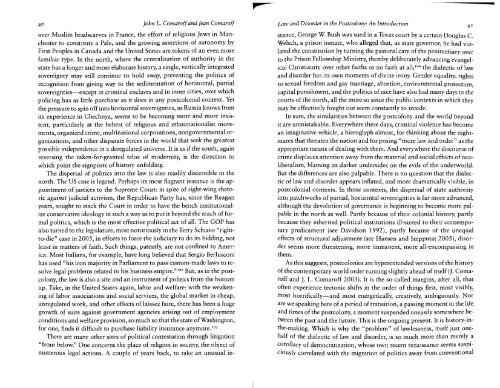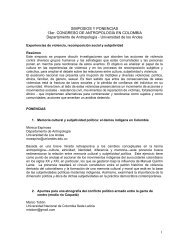Edited by Jean Comaroff and John L. Comaroff - 13 Congreso de ...
Edited by Jean Comaroff and John L. Comaroff - 13 Congreso de ...
Edited by Jean Comaroff and John L. Comaroff - 13 Congreso de ...
Create successful ePaper yourself
Turn your PDF publications into a flip-book with our unique Google optimized e-Paper software.
4°<br />
<strong>John</strong> L. <strong>Comaroff</strong><strong>and</strong> <strong>Jean</strong> <strong>Comaroff</strong><br />
over Muslim headscarves in France, the effort of religious Jews in Manchester<br />
to constitute a Pale, <strong>and</strong> the growing assertions of autonomy <strong>by</strong><br />
First Peoples in Canada <strong>and</strong> the United States are tokens of an even more<br />
familiar type. In the north, where the centralization of authority in the<br />
state has a longer <strong>and</strong> more elaborate history, a single, vertically integrated<br />
sovereignty may still continue to hold sway, preventing the politics of<br />
recognition from giving way to the sedimentation of horizontal, partial<br />
sovereignties-except in criminal enclaves <strong>and</strong> in inner cities, over which<br />
policing has as little purchase as it does in any postcolonial context. Yet<br />
the pressure to spin off into horizontal sovereignties, as Russia knows from<br />
its experience in Chechnya, seems to be becoming more <strong>and</strong> more insistent,<br />
particularly at the behest of religious <strong>and</strong> ethnonationalist movements,<br />
organized crime, multinational corporations, nongovernmental organizations,<br />
<strong>and</strong> other disparate forces in the world that seek the greatest<br />
possible in<strong>de</strong>pen<strong>de</strong>nce in a <strong>de</strong>regulated universe. It is as if the south, again<br />
reversing the taken-for-granted telos of mo<strong>de</strong>rnity, is the direction to<br />
which point the signposts of history unfolding.<br />
The dispersal of politics into the law is also readily discernible in the<br />
north. The US case is legend. Perhaps its most flagrant instance is the appointment<br />
of justices to the Supreme Court: in spite of right-wing rhetoric<br />
against judicial activism, the Republican Party has, since the Reagan<br />
years, sought to stack the Court in or<strong>de</strong>r to have the bench institutionalize<br />
conservative i<strong>de</strong>ology in such a way as to put it beyond the reach of formal<br />
politics, which is the most effective political act of all. The GOP has<br />
also turned to the legislature, most notoriously in the Terry Schiavo "rightto-die"<br />
case in 2005, in efforts to force the judiciary to do its bidding, not<br />
least in matters of faith. Such things, patently, are not confined to America.<br />
Most Italians, for example, have long believed that Sergio Berlusconi<br />
has used "his iron majority in Parliament to pass custom-ma<strong>de</strong> laws to resolve<br />
legal problems related to his business empire." 102 But, as in the postcolony,<br />
the law is also a site <strong>and</strong> an instrument of politics from the bottom<br />
up. Take, in the United States again, labor <strong>and</strong> welfare: with the weakening<br />
of labor associations <strong>and</strong> social services, the global market in cheap,<br />
unregulated work, <strong>and</strong> other effects of laissez faire, there has been a huge<br />
growth of suits against government agencies arising out of employment<br />
conditions <strong>and</strong> welfare provision, so much so that the state ofWashington,<br />
for one, finds it difficult to purchase liability insurance anymore. 103<br />
There are many other sites of political contestation through litigation<br />
"from below." One concerns the place of religion in society, the object of<br />
numerous legal actions. A couple of years back, to take an unusual in-<br />
,....-.<br />
4 1<br />
Law <strong>and</strong> Disor<strong>de</strong>r in the Postcolony: An Introduction<br />
stance, George W. Bush was sued in a Texas court <strong>by</strong> a certain Douglas C.<br />
Welsch, a prison inmate, who alleged that, as state governor, he had violated<br />
the constitution <strong>by</strong> turning the pastoral care of the penitentiary over<br />
to the Prison Fellowship Ministry, there<strong>by</strong> <strong>de</strong>liberately advancing evangelical<br />
Christianity over other faiths or no faith at all;104 the dialectic of law<br />
<strong>and</strong> disor<strong>de</strong>r has its own moments of divine irony. Gen<strong>de</strong>r equality, rights<br />
to sexual freedom <strong>and</strong> gay marriage, abortion, environmental protection,<br />
capital punishment, <strong>and</strong> the politics of race have also had many days in the<br />
courts of the north, all the more so since the public contexts in which they<br />
may be effectively fought out seem constantly to rece<strong>de</strong>.<br />
In sum, the similarities between the postcolony <strong>and</strong> the world beyond<br />
it are unmistakable. Everywhere these days, criminal violence has become<br />
an imaginative vehicle, a hieroglyph almost, for thinking about the nightmares<br />
that threaten the nation <strong>and</strong> for posing "more law <strong>and</strong> or<strong>de</strong>r" as the<br />
appropriate means of <strong>de</strong>aling with them. And everywhere the discourse of<br />
crime displaces attention away from the material <strong>and</strong> social effects of neoliberalism,<br />
blaming its darker un<strong>de</strong>rsi<strong>de</strong>s on the evils of the un<strong>de</strong>rworld.<br />
But the differences are also palpable. There is no question that the dialectic<br />
of law <strong>and</strong> disor<strong>de</strong>r appears inflated, <strong>and</strong> more dramatically visible, in<br />
postcolonial contexts. In those contexts, the dispersal of state authority<br />
into patchworks of partial, horizontal sovereignties is far more advanced,<br />
although the <strong>de</strong>volution of governance is beginning to become more palpable<br />
in the north as well. Partly because of their colonial history, partly<br />
because they inherited political institutions ill-suited to their contemporary<br />
predicament (see Davidson 1992), partly because of the unequal<br />
effects of structural adjustment (see Hansen <strong>and</strong> Stepputat 2005), disor<strong>de</strong>r<br />
seems more threatening, more immanent, more all-encompassing in<br />
them.<br />
As this suggests, postcolonies are hyperexten<strong>de</strong>d versions of the history<br />
of the contemporary world or<strong>de</strong>r running slightly ahead of itself (J. <strong>Comaroff</strong><br />
<strong>and</strong> J. L. <strong>Comaroff</strong> 2003). It is the so-called margins, after all, that<br />
often experience tectonic shifts in the or<strong>de</strong>r of things first, most visibly,<br />
most horrifically-<strong>and</strong> most energetically, creatively, ambiguously. Nor<br />
are we speaking here of a period of transition, a passing moment in the life<br />
<strong>and</strong> times of the postcolony, a moment suspen<strong>de</strong>d uneasily somewhere between<br />
the past <strong>and</strong> the future. This is the ongoing present. It is history-inthe-making.<br />
Which is why the "problem" of lawlessness, itself just onehalf<br />
of the dialectic of law <strong>and</strong> disor<strong>de</strong>r, is so much more than merely a<br />
corollary of <strong>de</strong>mocratization, whose own recent renaissance seems suspiciously<br />
correlated with the migration of politics away from conventional



